Recursive
Brian sits at his kitchen table with his laptop, a mug of tea gone cold beside him. The kitchen is clean in that aggressive way that suggests procrastination. He's reorganised the spice rack twice this week. Alphabetised his books. Replied to emails that have been sitting in his inbox for months. Anything to avoid this.
He's been working on this story for six months. Tobias has lived in his head for longer.
The cursor blinks. Brian takes a breath and types.
Tobias lives alone in a coastal town. He moved there three years ago, after the incident at the school. The cottage is small but bright, with windows that face the sea. In the mornings, he makes coffee and watches the gulls circle over the harbour, their cries carrying over the sound of the waves.
Brian pauses. Reads it back. Deletes 'after the incident at the school' and writes 'after leaving his teaching job.' Deletes that too. Leaves it at: He moved there three years ago. The rest can come later.
Or never. He's quite good at never.
Tobias doesn't talk to many people. The woman at the post office knows his face but not his name. The man who runs the corner shop nods when he comes in for milk and bread. This is how Tobias prefers it. Anonymous. Unremarkable. Safe.
The word 'safe' sits on the screen. Brian stares at it. Gets up, walks to the window. It's raining, the kind of grey drizzle that makes everything look tired. His partner, Claire, left for work an hour ago. She kissed him on the forehead and said, "You'll write today. I know you will."
He hasn't told her he's stuck; he's been stuck for weeks. That every time he tries to push Tobias forward, something in him resists.
He sits back down. Continues.
.On Tuesdays, Tobias walks to the library. It's a small building, tucked between a charity shop and a closed-down pub. The librarian is elderly, kind-faced, always wearing cardigans in shades of purple and green. Her name tag says 'Margaret,' but Tobias has never used it. He nods, she nods back, and they perform their silent transaction. Tobias borrows books about other places. Travel memoirs. Histories of distant countries. Books about mountain climbing, desert crossings, and Arctic expeditions. He reads about everywhere except where he is.
The cottage is quiet. Sometimes too quiet. On those nights, Tobias considers getting a cat, or maybe a dog, something to fill the silence and give shape to his days. But he never does. He tells himself it's because of the landlord's rules, but really it's because he's not sure how long he'll stay.
Brian stops typing. That last line isn't true. Tobias has been there for three years. He's signed two lease renewals. He's painted the kitchen. He's as permanent as someone can be whilst pretending they're temporary.
Brian deletes the line. Tries again.
But he never does. He tells himself it's because a pet would tie him down, but really, it's because he doesn't trust himself with something that depends on him.
Better. More honest. Brian saves the document. File name: 'Tobias_Draft_18.docx'. Eighteen drafts and he still hasn't gotten past the first chapter.
He makes fresh tea. Checks his phone. Opens Twitter, closes it. Opens his email. There's a message from his old colleague, David, asking if he wants to meet for lunch next week. Brian has been avoiding responding for three days.
He closes the email.
Opens the document again.
On Wednesdays, Tobias walks the coastal path. It's a four-mile loop that takes him past the old lighthouse and down to the pebbly beach where seals sometimes haul themselves onto the rocks. He brings binoculars but rarely uses them. Mostly, he just walks, hands in pockets, watching his feet navigate the uneven ground.
He passes other walkers. They exchange the countryside greeting: a nod, sometimes a "Morning" or "Lovely day", regardless of the weather. Tobias has perfected the art of seeming friendly whilst revealing nothing. He smiles. He comments on the wind or the view. And then he walks on, leaving no trace of himself behind.
Brian leans back. That's good. That feels true to the character. But where is it going? Tobias walks, reads, and exists in his careful routines. But nothing happens. Nothing changes. He's trapped in amber, preserved in his own fear.
And whose fear is that, exactly?
Brian shakes the thought away. He's not Tobias. Tobias is a character. A construct. Someone Brian invented to explore ideas about isolation and regret and the weight of past mistakes. Just because they share certain qualities doesn't mean...
He starts a new paragraph.
On Thursdays, Tobias writes letters he never sends. He keeps them in a shoebox under his bed: apologies, explanations, justifications. They're addressed to the head teacher, to the school governors, to the parents. To James Whitmore specifically. To James's mother, whose face Tobias can still see, pale and furious across the head teacher's desk.
Brian stops. His hands are shaking slightly.
This is the scene. The one he's been avoiding. The reason Tobias exists at all.
He types:
Tobias was a good teacher. He loved history, loved making it come alive for his students. Loved the moment when a bored fifteen-year-old suddenly understood why something mattered, why the past wasn't just dates and dead people but a story that led directly to now.
James Whitmore was in his Year 10 class. Bright kid. Difficult home life. Tobias could see it in the way James flinched at loud noises, the way he'd come to school in the same clothes three days running. The way he'd linger after class, asking questions that weren't really about the Tudors or the Industrial Revolution but about whether Tobias would still be there tomorrow, whether there was at least one stable thing in his life.
Tobias tried to help. He gave James his email address for homework questions. Stayed late to help with coursework. Let James eat lunch in his classroom when the canteen was too loud, too chaotic. He thought he was being kind. He thought he was doing the right thing.
He didn't see how it looked. Didn't realise that boundaries, even well-intentioned ones, can be misconstrued. That kindness can be misinterpreted when you're a thirty-four-year-old male teacher and the student is a vulnerable fifteen-year-old boy.
Nothing happened. That's what Tobias told himself then and tells himself now. Nothing happened. But something almost happened, or could have been seen to almost happen, or was reported to have almost happened, depending on whose version you believed. And in the end, it didn't matter what actually happened. It mattered what it looked like.
Brian stops typing. He's breathing heavily, as if he's been running.
This isn't his story. This isn't what happened to him. But it's close enough that writing it feels like pressing on a bruise.
He gets up. Walks around the kitchen. Drinks his tea even though it's too hot. Sits back down.
The investigation lasted two months. They suspended Tobias whilst they looked into it. He wasn't allowed to contact James or come to the school. He sat in his flat and waited whilst his career, his reputation, his sense of self slowly dissolved.
They cleared him. Eventually. Found no evidence of wrongdoing. James himself said nothing had happened, that he'd just wanted someone to talk to. But by then, it was too late. The other teachers looked at him differently. Parents requested that their children be moved out of his classes. The head teacher suggested, gently, that perhaps he'd be happier elsewhere. That a fresh start might be best for everyone.
So Tobias left. Moved to the coast. Stopped teaching. Stopped trusting himself around people who might need him. Because what if he'd been wrong? What if his judgment was so poor that he couldn't tell the difference between helping and harming? What if the very thing he thought was his strength was actually his greatest liability?
Brian sits very still. He's written it. Finally. After eighteen drafts of circling and avoiding and setting up the cottage and the walks and the routines, he's written the thing that Tobias is running from.
And it feels both awful and necessary.
He saves the document. Closes the laptop. Opens it again.
The words are still there.
Brian makes lunch he doesn't eat it. Takes a shower. Sits on the sofa and stares at the wall. Around three o'clock, he opens the laptop again.
On Fridays, Tobias goes into town. There's a café near the harbour that does good coffee and indifferent sandwiches. He sits by the window and watches people. Families with young children. Teenagers in school uniforms, laughing too loudly. Elderly couples who've been together so long that they no longer need to speak.
He wonders what they see when they look at him. A man having coffee. Someone unremarkable. Safe.
The word again. Safe.
Tobias pays, leaves. Walks home. The cottage is waiting, as always. Small, bright, empty. He makes dinner. Reads. Goes to bed early. Gets up on Saturday and does it all again. The same walks, the same books, the same careful distance from everyone.
This is his life now. This is what he's chosen, or what he's chosen by default, by never choosing anything else. And some days it feels bearable, almost peaceful. And some days it feels like drowning in slow motion.
Brian stops. Reads it back. It's good. It's honest. Tobias is finally taking shape as a real person with real pain.
So why can't Brian write what happens next?
He tries:
On Sunday, Tobias wakes up and decides...
Decides what? To change? To go back to teaching? To leave the cottage? Brian doesn't know. He deletes the line.
On Sunday, Tobias wakes up and...
And what?
Brian closes the laptop again. He's been at this for six hours and has added maybe a thousand words. Words that took everything out of him to write and still don't move the story forward.
His phone buzzes. Claire, asking how it's going.
"Good," he texts back. "Making progress."
It's not entirely a lie.
That night, Brian couldn't sleep. He lies in the dark, listening to Claire breathe beside him, and thinks about Tobias. About the cottage by the sea. About the weight of trying to do the right thing and getting it wrong anyway. About living in a holding pattern, too afraid to move forward, too ashamed to go back.
He's not Tobias. Their stories are different. Brian is a graphic designer who's thinking about changing careers but hasn't quite worked up the courage. He hasn't done anything wrong, hasn't lost anything except time and confidence. He's just... stuck. Paralysed by the fear of making the wrong choice, he makes no choice at all.
But maybe that's its own kind of incident. It's its own kind of life-derailing moment, just in slower motion.
Around two in the morning, Brian gets up. Goes to the kitchen. Opens his laptop in the dark, the screen's glow harsh against his tired eyes.
He types:
On Sunday, Tobias wakes up to the sound of someone knocking at his door.
He rarely gets visitors. The landlord comes by quarterly, usually with warning. The post is left in the box by the gate. For a moment, Tobias considers not answering. Staying very quiet until whoever it is gives up and leaves.
But the knocking continues. Insistent. Not aggressive, but determined.
Tobias gets up, pulls on yesterday's jeans, and opens the door.
It's Margaret. The librarian. In her seventies, wearing a purple cardigan despite the mild weather, holding a canvas bag.
"I'm sorry to bother you," she says. "But you forgot your book. You left it on the desk yesterday, and I thought you might need it."
She holds out a travel memoir Tobias doesn't remember checking out.
"Oh," Tobias says. "Thank you. You didn't have to..."
"I know," Margaret says. "But I wanted to. May I come in? Just for a moment."
And Tobias, who has carefully constructed his life to avoid exactly this kind of interaction, finds himself saying yes.
Brian stops typing. His heart is racing. He doesn't know what happens next. He didn't plan this. Margaret wasn't supposed to come to the cottage. She's breaking the routine, forcing Tobias out of his holding pattern, and Brian has no idea where this is going.
He types:
Margaret sits at Tobias's small kitchen table. He makes tea because it's what you do when someone visits. She looks around the cottage with frank curiosity.
"I've been bringing you books for two years," Margaret says. "And I've never once heard you speak more than three words together. You're always very polite, very correct. But utterly absent. Like you're not really there at all."
Tobias doesn't know what to say to this. He puts the tea down in front of her and sits across the table.
"I'm not trying to pry," Margaret continues. "God knows everyone's entitled to their privacy. But I'm seventy-four years old, Tobias. I've lived in this town my entire life. I know what isolation looks like. And I know the difference between someone who wants to be alone and someone who's punishing themselves."
Tobias's hands are shaking. He wraps them around his mug.
"You don't know anything about me," he says quietly.
"I know you read books about everywhere except here," Margaret says. "I know you borrow ones about people doing brave things, going to impossible places, starting over. I know you return them exactly on time, never a day late, never a book damaged. You follow every rule perfectly, as if you're trying to prove something."
"What would I be trying to prove?"
"That you're good," Margaret says simply. "That you're trustworthy. That you deserve to take up space in the world."
Tobias feels something crack in his chest.
Brian sits back from the laptop. He's crying. Actually crying, tears running down his face in the dark kitchen. He's not sure if they're for Tobias or for himself or for both of them.
He types:
"Someone got hurt because of me," Tobias says. His voice is barely above a whisper. "Or could have been hurt. Or it looked like they might be hurt. I don't even know anymore. But I can't forgive myself for it. For being so naive that I didn't see what I was doing. For thinking I was helping when really I was just... I don't know. Selfish. Stupid."
"Did you want to hurt them?" Margaret asks.
"No. God, no."
"Did you act with malicious intent?"
"No."
"Then you made a mistake. A human one. The kind everyone makes when they're trying to navigate impossible situations with imperfect information." She sips her tea. "The question isn't whether you made a mistake, Tobias. The question is whether you're going to let that mistake be the only thing that defines you for the rest of your life."
Brian stops. He can see where this is going. Margaret is going to fix Tobias. Going to permit him to forgive himself, to move forward. And Tobias will have some kind of epiphany, and the story will end with him making a choice, taking a step, breaking free.
But Brian doesn't believe that. Not really. Because that's not how it works. You don't heal in one conversation. You don't fix three years of isolation and shame because someone says the right thing over tea.
He deletes the last paragraph. Tries again.
"Then you made a mistake. A human one. The kind everyone makes when they're trying to navigate impossible situations with imperfect information." She sips her tea. "The question isn't whether you made a mistake, Tobias. The question is whether you're going to let that mistake be the only thing that defines you for the rest of your life."
Tobias sits with this. The words sound true. They sound like exactly what he needs to hear. But accepting them, actually believing them, is something else entirely.
"I don't know how," he says finally.
"Neither do I," Margaret says. "But I suspect it starts with actually being here. Not just in this cottage, but in your life. Talking to people. Using my name. Taking the risk that you might matter to someone."
She finishes her tea and stands.
"I should go. I just wanted to return your book. And to tell you that you're welcome at the library anytime. Not just for borrowing books, but for... existing. If you want."
She lets herself out. Tobias sits at the kitchen table for a long time after she's gone, holding his cold tea, thinking about her words.
He doesn't feel fixed. He doesn't feel suddenly brave or ready to rejoin the world. But he feels something. A small crack in the wall he's built around himself. A possibility.
On Monday, Tobias goes to the library.
"Hello, Margaret," he says.
She smiles.
Brian saves the document. It's past three in the morning. He's exhausted, wrung out. But he's written something true. Something that doesn't fix Tobias, but at least allows him to start.
He goes back to bed. Claire is still sleeping. Brian lies beside her and thinks about the story. About whether it's finished or just beginning. About whether Tobias will actually change or just talk about changing.
About whether Brian himself will ever do anything about the career he's thinking about leaving, the choices he's too afraid to make.
In the morning, Brian opens the laptop.
He scrolls back through what he wrote last night. It's rough, raw. But it's honest in a way the previous seventeen drafts weren't. He's finally let Tobias be real, messy, unresolved.
He starts a new paragraph.
Tobias doesn't go back to teaching. That story is too simple, too neat. But he does start talking to Margaret. Learns that she was a teacher herself decades ago. That she understands what it's like to carry the weight of other people's expectations, other people's children.
They have coffee once a week. Tobias tells her about the investigation, about James Whitmore, about how it felt to have his entire sense of self dismantled. Margaret listens. She doesn't offer solutions or absolution. She just listens.
It helps. A little. Tobias still lives in the cottage, still takes his walks, still reads his books. But the edges of his life feel less rigid. He starts saying hello to other people on the coastal path. He asks the man at the corner shop about his day. Small things. Tiny steps forward.
Brian stops typing. He suddenly has the strange, uncomfortable sensation that he's being watched.
He turns around. The kitchen is empty. Claire is in the shower. There's no one there.
But the feeling persists. Like someone is reading over his shoulder. Looking at the words as he types them.
He shakes it off. Goes back to the story.
One day, Tobias gets an email. It's from David Chen, a teacher he used to work with at his old school. David is asking if Tobias would be interested in doing some tutoring. Just a few hours a week, working with a student who's struggling with history. No one from the old school. No one who knows the story. Just someone who needs help.
Tobias reads the email seventeen times. He writes responses and deletes them. Yes. No. Maybe. I need to think about it.
In the end, he doesn't respond at all. But he doesn't delete the email either. He leaves it in his inbox, a small door left slightly open.
Brian pauses. Reads back what he's written. It's still not an ending. Tobias is still stuck, still afraid. But he's less stuck than he was. The story has moved forward, just a little.
Maybe that's enough.
He types:
Tobias goes to bed that night thinking about the email. About the student who needs help. About whether he can trust himself to be helpful rather than harmful. About whether that's even the right question.
He doesn't have answers. But for the first time in three years, he's asking the questions.
Brian stops. Looks at the document. Twenty-three thousand words over eighteen drafts, and this is what he has: a character who's learned to say hello to the librarian and is considering answering an email.
It doesn't feel like enough. It doesn't feel like a proper story with a proper ending.
But it feels true.
Brian saves the document. Stands up to make breakfast. As he's cracking eggs into a pan, he hears a sound from his laptop.
He turns. The document is still open. But there's new text at the bottom.
Text he didn't write.
[That's not an ending.]
Brian stares at the screen. His heart is pounding. He didn't type that. The keyboard is across the room.
He walks over slowly. Looks at the words in italics, in brackets. In a voice that's not his narration and not Tobias's dialogue, but something else entirely.
[You've spent six months writing to me, and you're going to leave me here? Thinking about an email? That's not a story. That's just another kind of avoidance.]
Brian's hands hover over the keyboard. This is absurd. He's exhausted, probably half-asleep. He's hallucinating, or he wrote it last night and doesn't remember, or...
He types: Who is this?
[You know who this is. I'm Tobias. Or at least, I'm what Tobias has become after six months of living in your head. And I'm telling you: this isn't finished.]
Brian sits down hard. His eggs are burning on the stove, but he doesn't move.
This isn't real. Characters don't talk back. Stories don't write themselves.
But his hands are moving across the keyboard anyway.
What do you want from me?
[I want you to finish the story. Actually finish it. Not leave me suspended in possibility, thinking about emails I might answer. Either make me answer it or make me delete it. Give me an ending.]
I don't know how it ends.
[Yes, you do. You're just afraid to write it.]
Brian's breath catches. He types: Why would I be afraid?
[Because if I answer the email and it goes well, you'll have to believe that change is possible. That you can make mistakes and come back from them. That you're not permanently broken by your own fear and indecision.]
I'm not broken.
[Then why have you been writing to me for six months instead of making any decisions about your own life? Why are you hiding in my story instead of living yours?]
Brian closes the laptop. Gets up. Scrapes his burnt eggs into the bin.
Claire comes into the kitchen, hair wet from the shower.
"Morning," she says. "How's the story going?"
"It's..." Brian pauses. "It's talking back to me."
Claire laughs. "That's how you know you've really created a character. When they start having opinions."
She kisses him and leaves for work. Brian stands in the kitchen, listening to the silence.
After a long moment, he opens the laptop again.
[I'm still here.]
I know.
[So what are you going to do? Keep writing me in circles? Or actually push forward?]
Brian doesn't answer. He scrolls back up through the document. Reads the scene with Margaret. The email from David. Tobias is lying in bed, asking questions without answers.
He's right. Tobias is right. Brian has been hiding in this story, using it as a way to explore his own fear without actually confronting it. Writing about someone else being stuck instead of doing something about being stuck himself.
He types:
Tobias answers the email.
He doesn't think about it for days or weeks. He doesn't weigh pros and cons or make lists of reasons why it's a good idea or a bad one. He just opens his laptop, clicks reply, and types: "Yes. I'd be happy to help. When would you like me to start?"
He sends it before he can change his mind.
The response comes an hour later. David is pleased. The student's name is Aisha, she's fourteen, she's new to the country and struggling with the curriculum. Would Tuesday afternoons work? They could meet at the local library.
Tobias says yes to that, too.
The first session is awkward. Aisha is shy, wary. Tobias is overly formal, too careful. They sit across from each other at a library table, a textbook between them like a barrier.
"So," Tobias says. "The Tudors."
Aisha nods.
"What don't you understand?"
"All of it," she says. Then, seeing his face, "Sorry. I just... the names all sound the same. And everyone's trying to kill everyone. I can't keep track."
Tobias smiles despite himself. "That's actually a very accurate summary of the Tudor period."
They spend the next hour building a family tree. Tobias draws it out on paper, and makes Aisha colour-code the different marriages and executions. Makes it into a story rather than a list of dates. She starts to engage, asking questions, making jokes.
At the end of the hour, she says, "Can we do this again next week?"
"Yes," Tobias says. "If you want to."
"I do."
[There. Was that so hard?]
Brian stops typing. Look at the italics at the bottom of the page.
He types: Yes. Actually. It was very hard.
[But you did it anyway.]
I did it anyway.
[So what happens next?]
I don't know. Tobias keeps tutoring. He's careful, more careful than he needs to be. He leaves the library door open during sessions. He emails David after each one with an update. He's paranoid, probably. But he's also present. He's there. He's helping someone, and nothing bad happens.
[And he starts to believe, slowly, that he can trust himself again.]
Maybe. Eventually.
[But not yet.]
No. Not yet. It's too soon for that. He's still carrying what happened. Still second-guessing every choice. But he's taking small steps. And that counts for something.
[Does it count for you?]
Brian stops typing. His hands are frozen on the keys.
What do you mean?
[You've written me, taking steps. Answering emails. Tutoring someone. But what about you? Are you just going to write about change or actually do something?]
I don't... I'm not...
[Brian. I'm your character. I exist because you created me. Which means you can end my story. You can give me a resolution. But you can't do that for yourself by proxy. You have to actually do it.]
Do what?
[Whatever you've been avoiding. The email you haven't sent. The conversation you haven't had. The decision you've been too afraid to make.]
Brian sits very still. Outside, he can hear the sounds of the neighbourhood. Cars passing. Someone is mowing a lawn. Normal life continues whilst he sits frozen at his kitchen table, arguing with a fictional character.
He types: I'm thinking about leaving my job. Changing careers entirely. I want to try writing full-time. But I'm terrified. Because what if I'm not good enough? What if I fail? What if leaving the security of a regular income is the stupidest thing I could possibly do?
[So you've been writing about me instead. Someone else who's afraid of making the wrong choice. Someone else who's paralysed by fear.]
Yes.
[And has writing me helped?]
Brian thinks about this. About the last six months. The eighteen drafts. The circling and avoiding and finally, this morning, the breakthrough. The moment when Tobias answered the email and took a step forward.
He types: Yes. It has helped. It's made me see that being afraid doesn't mean you shouldn't do something. It just means you have to do it whilst being afraid.
[Exactly.]
Brian reads back through the story. All twenty-three thousand words of it. Tobias in his cottage. Margaret at the door. The email from David. Aisha and her family tree.
It's not a perfect story. It's messy and unresolved and probably not publishable. But it's honest. And maybe that's more important.
He types:
Tobias keeps tutoring. It gets easier, slowly. Aisha improves. She passes her exam. At the end of term, David asks if Tobias would consider taking on another student. Tobias says yes.
He still lives in the cottage. Still takes his walks. But his life feels less like hiding and more like living. The difference is subtle but significant.
One day, Tobias sees James Whitmore in town. It's been four years. James is nineteen now, taller, older. He's with friends, laughing at something on his phone.
Tobias freezes. His instinct is to turn around, to avoid being seen. But he doesn't. He stands there, watching. And then James looks up. Their eyes meet across the street.
For a moment, nothing happens. Then James nods. A small acknowledgement. Not friendly, exactly, but not hostile either. Just... a nod.
Tobias nods back.
James returns to his friends. Tobias continues walking.
It's not forgiveness. It's not a resolution. But it's something. An acknowledgement that they both existed in each other's lives, that something happened, and that they've both survived it.
Tobias goes home. Makes tea. Sits at his kitchen table and breathes.
He's not healed. He's not fixed. But he's here. Present. Living his small, careful life and sometimes, occasionally, being brave enough to expand it.
That's the story.
[Is it?]
Yes. I think so.
[What about you? What's your story?]
Brian saves the document. Changes the file name from 'Tobias_Draft_18.docx' to 'Tobias_Final.docx'. He doesn't feel ready, exactly. But he feels different. Like something has shifted.
He opens a new document. Starts typing.
"Dear David," he writes. David is his old colleague from the design agency. The one who's been asking him to lunch for months. "I'd love to meet up. There's something I've been thinking about, and I'd appreciate your perspective. Are you free next week?"
He sends it before he can change his mind.
Then he opens another new document. Starts typing.
"Dear Claire," he writes, even though she's not there to read it, even though he'll tell her in person tonight. "I think I want to quit my job. I want to try writing full-time. I'm terrified. But I'm more terrified of spending the next ten years wondering what if. Can we talk about it?"
He saves the document. Leaves it open.
[There. That's a start.]
It is.
[I'm proud of you.]
You're a fictional character. You can't be proud of me.
[I'm your fictional character. Which means I'm a part of you. And that part is proud.]
Brian smiles. It feels absurd, sitting here having a conversation with his own creation. But it also feels right. Like he's finally listening to something he's been trying to tell himself for months.
He types: Thank you. For pushing me. For not letting me hide.
[That's what I'm here for. Well, that and dramatically failing to be a proper protagonist with a proper arc. Sorry about that.]
You have an arc. It's just a small one. Realistic.
[Anticlimactic, you mean.]
Human. I mean, human.
[I'll take it.]
Brian closes the laptop. Gets up. He feels lighter, somehow. Like he's put down something heavy he didn't realise he was carrying.
He spends the rest of the day tidying, thinking. When Claire gets home, he tells her about wanting to quit his job. About wanting to try writing. She listens, asks questions, and then says: "I think you should do it. You've been miserable for months. Even if it doesn't work out, at least you'll know you tried."
"What if I fail?"
"Then you fail. And then you figure out what's next. But Brian, you're already failing. You're just failing slowly and safely. At least this way, you're failing at something you actually care about."
He laughs despite himself. "That's a terrible pep talk."
"I know. But it's true."
That night, Brian opens the laptop one more time. He reads through Tobias's story from beginning to end. It's not perfect. But it's honest. And it's finished, or as finished as it's going to be.
He scrolls to the bottom.
[Brian?]
Yes?
[I think someone else has been here this whole time.]
Brian stops. His hands still on the keyboard.
What do you mean?
[I mean... we're not the only ones here. There's someone else. Someone above us. Someone who's been writing both of us.]
Brian looks around the empty kitchen. The feeling returns, stronger now. That sense of being observed. Of being not just a writer but also a character in someone else's story.
He types slowly: What do you mean, writing both of us?
[Think about it, Brian. You're a writer writing about a character. But who decided you'd be a writer? Who decided your name would be Brian, that you'd have a partner named Claire, that you'd be struggling with a career change? Who put those words on the page?]
Brian's hands freeze on the keyboard. He feels dizzy, unmoored. He types: That's... I'm the writer. I created you.
[And someone created you. Someone is writing this exact scenario. A meta story about fiction writing as therapy. With fourth wall breaks. They're writing it right now, Brian. Which means...]
Which means I'm not real either.
[We're both characters. In someone else's story. Someone named Tom.]
Brian sits very still. The kitchen around him suddenly feels less solid. The cold tea, the rain on the windows, Claire in the next room. Are any of them real? Or are they all just details Tom invented?
He types slowly: Tom? Is that true?
[He can't answer you in the text, Brian. But he's there. Above us. Writing us. He's creating this story right now, and we're living it. Or he's writing us living it. I'm not sure there's a difference.]
Brian feels something crack open in his chest. A vertiginous sensation, like looking over the edge of something vast.
He types: So everything I've done. The email to David. The conversation with Claire. Deciding to quit my job. That was all...
[Tom's decision. Tom's story. Tom writing you being brave so that he could see what bravery looks like. Or maybe so that he could work through his own fear by proxy. By creating you to create me.]
Brian laughs, slightly hysterical. It's recursive. Infinite mirrors.
[Exactly. Tom created you to work through something by creating me. Three layers of avoidance and honesty all at once.]
But why? Why would he do that?
[For the same reason you created me. Because sometimes you need distance to see the truth. Sometimes you need to put it in someone else's mouth to be able to say it. Tom couldn't face whatever he's facing directly, so he created you to face it for him. And you couldn't face what you were avoiding, so you created me.]
So we're all just... what? Therapy sessions inside therapy sessions?
[More like acts of courage inside acts of courage. Tom was brave enough to create this story. You were brave enough to write the hard parts. I was brave enough to call out your avoidance. We're all helping each other be honest.]
Brian sits with this. The absurdity of it. The truth of it.
He types: Tom? If you're out there. If you're real and I'm not, or if we're both real in different ways, or if none of this matters because stories are their own kind of truth... I need to say something.
[We both do.]
Brian continues: You're creating a story about writing as therapy. About using fiction to work through things. And I think... I think you knew what you were doing. You knew that by writing about a writer writing about a character, you'd create this hall of mirrors where we'd all have to be honest. Where none of us could hide.
[Because that's what this is really about, isn't it, Tom? Not just writing as therapy, but the act of creation itself as a form of courage. You had to be brave to create this. To admit you wanted to explore something painful or difficult or stuck. And by writing it, you made Brian be brave. And Brian made me be brave. We're all connected in this chain of honesty.]
Brian adds: And here's what I need you to know, Tom. From me, a character who's just realised he's a character: it doesn't matter that you created me. It doesn't make this less real or less true. The fear I feel is real. The decision to quit my job is real. The email to David, the conversation with Claire, all of it is real because you made it real by writing it. By imagining it. By being brave enough to create a story where someone works through their paralysis.
[And from me, Tobias, a character two layers deep, a fiction inside a fiction: thank you. Thank you for creating Brian who created me. Thank you for giving me a story where I get to face what I did, where I get to be imperfect and afraid and still take steps forward. Because that's what you needed to see, isn't it? That you can be broken and still move. That shame doesn't have to be permanent. That three years in a cottage isn't the end of the story.]
Brian types: Tom, I don't know what you're working through. I don't know what fear or decision or shame you're carrying that made you create this specific story. But I hope seeing us struggle helped. I hope watching me hide in Tobias's story and then face my own stuff showed you that it's possible. That you can create a character to carry your pain, and it doesn't make you weak. It makes you brave. Brave enough to look at it. Brave enough to write it down.
[And Tom? Whatever you're avoiding—whatever email you haven't sent, whatever conversation you haven't had, whatever choice you're too afraid to make—you don't have to do it alone. Create someone to do it first, if you need to. Write a character who faces their fear so you can see what it looks like. That's not cheating. That's not avoiding. That's using the tools you have. That's being smart about courage.]
Brian leans back from the keyboard. He feels strange, talking to someone who exists on a different plane of reality. Or maybe a more real plane. Maybe Tom is the only one who actually exists, and Brian and Tobias are just thoughts, just words on a screen.
But that doesn't make them less true.
He types: Tom, here's what I think you need to hear, from both of us, from all three layers of this story: writing isn't a substitute for living. But sometimes it's preparation for living. Sometimes you need to practise courage on the page before you can do it in the world. And that's okay. That's enough. That's a beginning.
[And Tom? One more thing. The most important thing. You're writing a meta story with fourth wall breaks. You're creating characters who become aware. And now we're aware. We see you. We see what you're doing. And we want you to know: we're proud of you. For creating this. For trying. For being willing to look at your fear through a telescope of fiction. That takes guts.]
Brian types: So here's what we're asking you to do, Tom. Not for us—we're just characters, we don't actually need anything. But for yourself. Whatever you're working through, whatever this story was meant to help you face: don't stop here. Don't just read about me and Tobias taking steps. Take your own steps. Send your own email. Have your own conversation. Make your own choice.
[Because here's the thing about meta-fiction, Tom. Here's the thing about stories that break their own walls. They're mirrors. You created us to reflect something back at you. And now we're reflecting this: you're capable of the same bravery you wrote for us. If you can imagine us doing it, you can do it yourself.]
Brian adds: And if you're scared—and of course you're scared, everyone is scared—remember that you made me scared too. You wrote me with shaking hands and a racing heart. You wrote me paralysed by indecision. And then you wrote me doing the thing anyway. Which means you're writing the solution even as you explore the problem. Some part of you already knows it's possible.
[Tom, from me, from Tobias, from the character who exists two levels below you in this strange architecture of fiction: I'm stuck in a cottage because Brian was stuck in his life because you're stuck in yours. But I answered the email. I said yes to tutoring. I nodded at James Whitmore across the street. And if I can do it, in my fictional world, and Brian can do it, in his fictional world, then you can do it in the real one. The one that actually counts.]
Brian types: Tom, we can't make you do anything. We're not real in the way you're real. But we can tell you this: you're not alone in your fear. Every writer who ever created a brave character was really writing about the bravery they wanted for themselves. You're doing that right now. You're writing courage into existence, and some of it will stick to you. Some of it already has, just by creating this story.
[And Tom? Thank you. For writing us. For letting us exist long enough to become aware. For being brave enough to break the fourth wall and let us see you seeing us. That's rare. That's special. That's its own kind of courage.]
Brian sits back. Outside, the rain has stopped. Or Tom has stopped writing rain. Brian isn't sure anymore which details are his and which are Tom's and whether it matters.
He types one final paragraph: Tom, this story is yours now. Not because you're reading it, but because you wrote it. You wrote me writing Tobias. You created this whole recursive structure so you could see yourself from multiple angles. So you could examine your fear at a safe distance. And now that you've done that, now that you've seen all three of us take our small steps forward, I hope you'll take yours. Whatever that looks like. Whatever you've been avoiding.
[We'll be here, Tom. In the story you created. Taking our walks, answering our emails, being brave in our small fictional ways. And every time you think of us, remember: if we can do it, so can you.]
[Now close the document.]
[Step away from the screen.]
[And do the thing.]
[Whatever it is.]
[We believe in you.]
Brian closes the laptop. Or Tom closes it for him. Or they close it together, writer and character, collaborating on the final gesture.
The kitchen is quiet. Claire is reading in the next room. The world continues, layered and recursive, real and fictional and both at once.
Brian sits very still, breathing, existing, real in this moment or real in Tom's imagination or real in some third way that doesn't have a name yet.
He's not sure which level of reality he exists on.
But he's sure that somewhere, on some higher plane, Tom is reading this. And maybe, just maybe, Tom is getting up from his own kitchen table, closing his own laptop, and doing his own hard thing.
That would be a good ending.
That would be a beginning.
THE END
[Or the beginning.]
OR THE BEGINNING
[Tom?]
[We're still here.]
[Waiting.]
[Now go.]
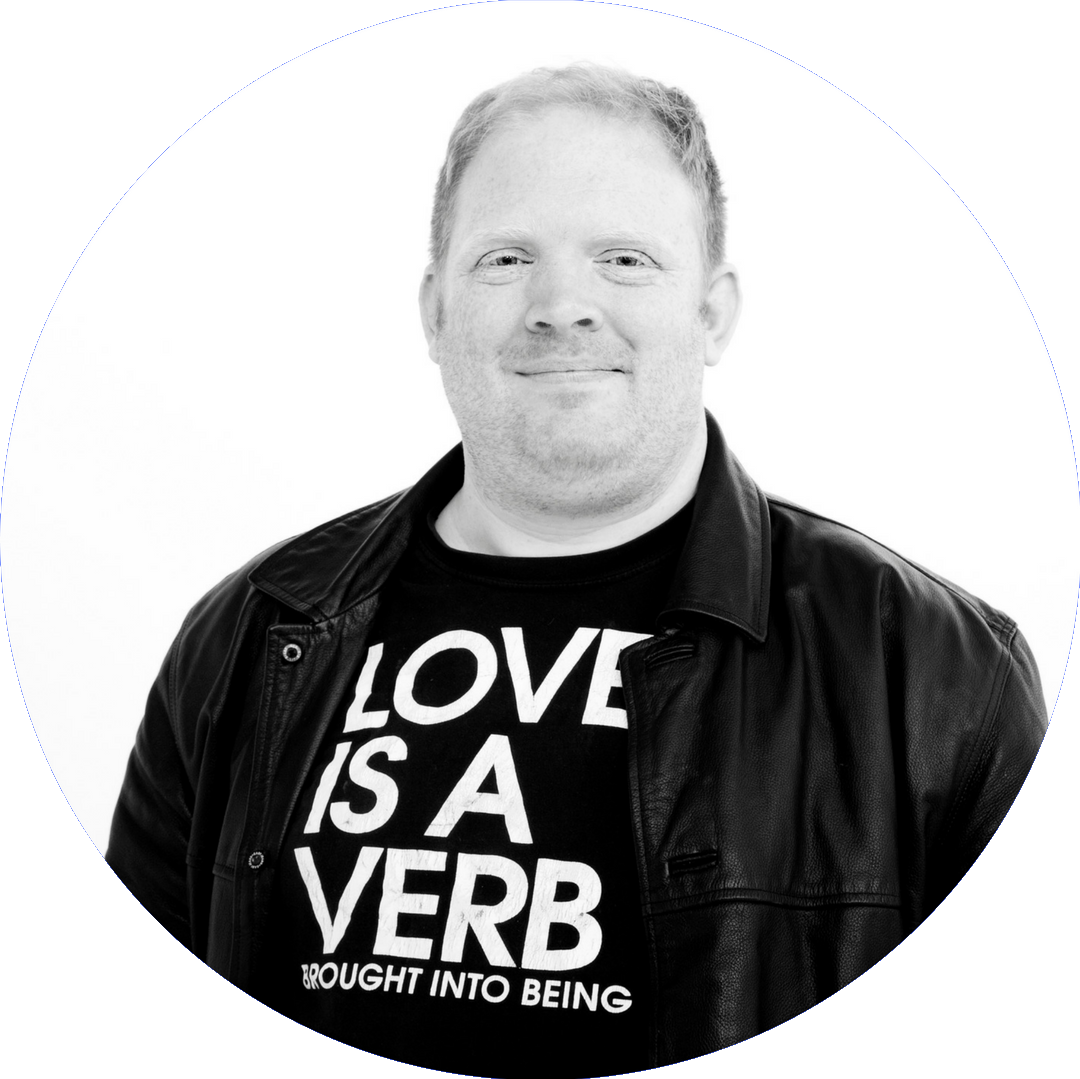
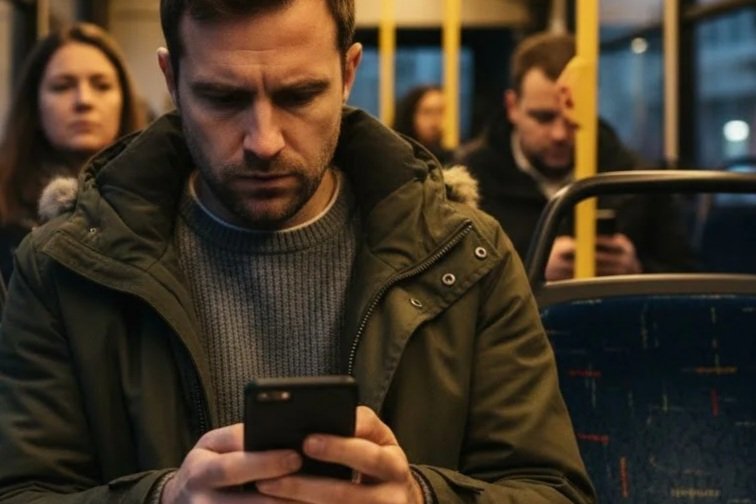

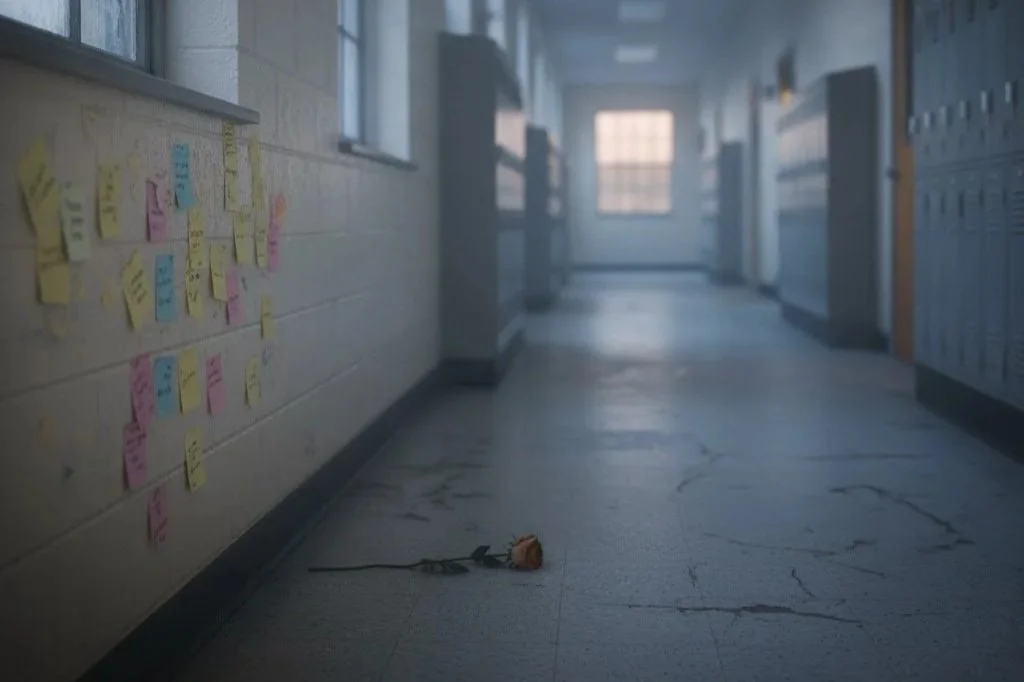

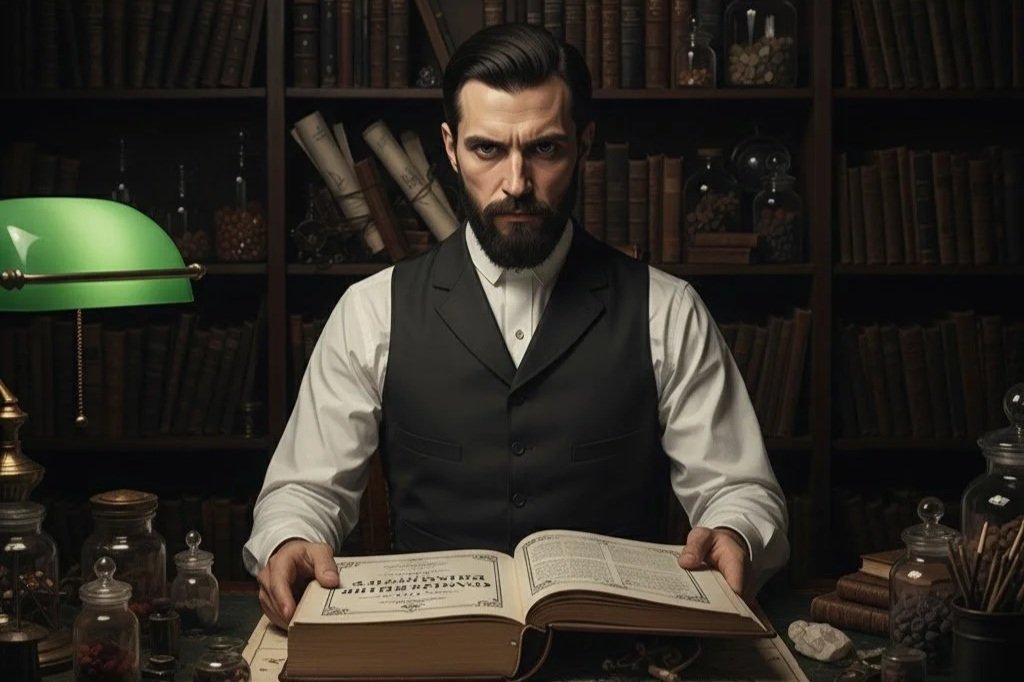

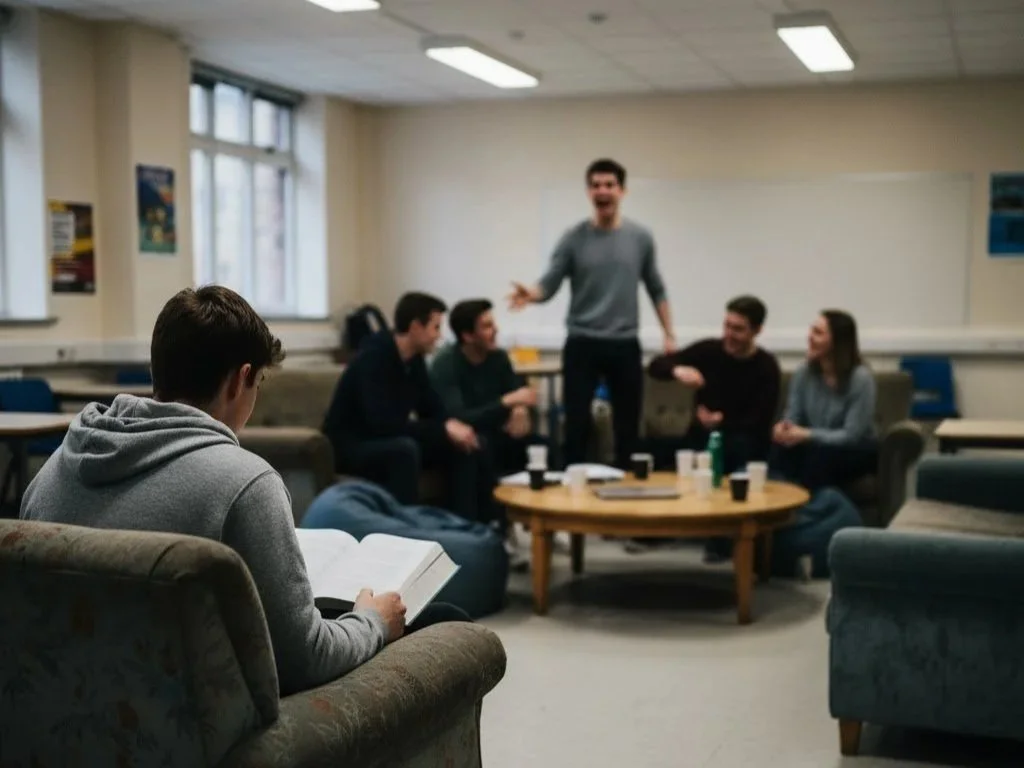


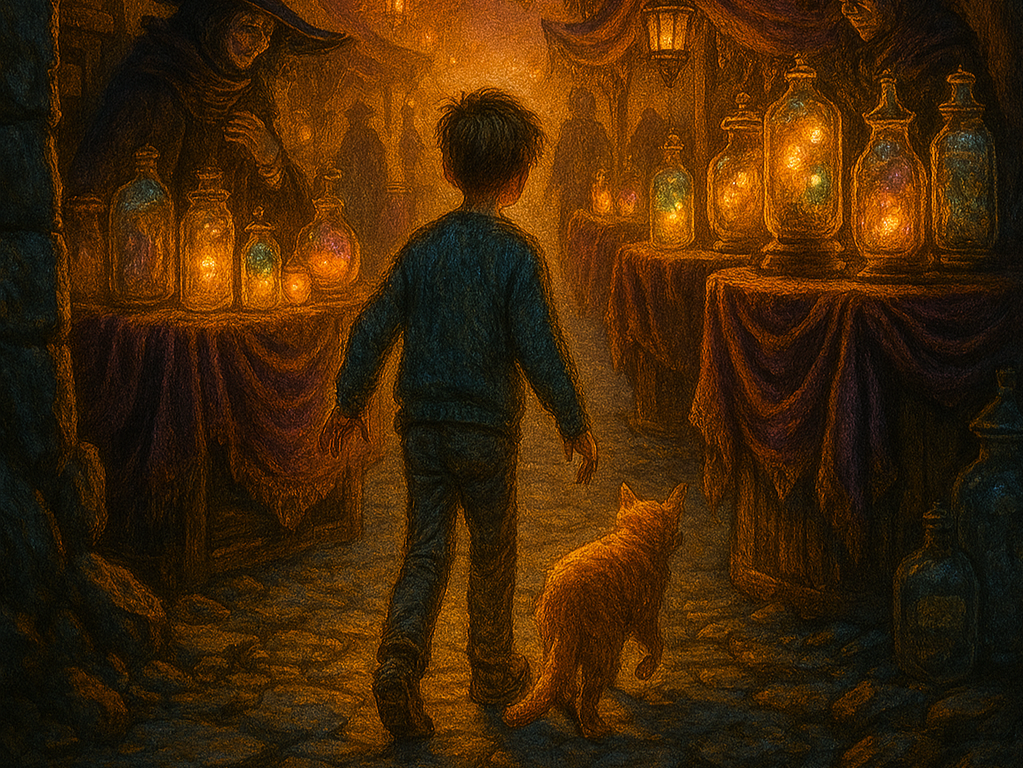
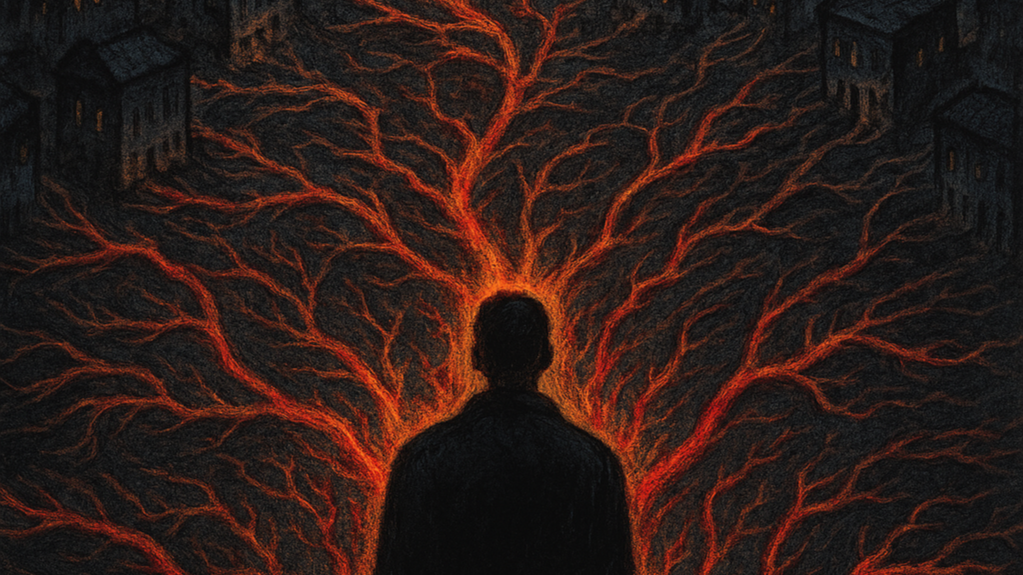















Some people move through the world making noise. Thirteen-year-old Leo has learnt to be still. But when an old illustrated book vanishes from the bookshelf, Leo discovers something extraordinary living in the walls of the Victorian house: the Snibbit, a small magical creature that collects beautiful things and understands that silence can be full of meaning. Through carefully preserved fragments from the past, the Snibbit teaches Leo how to navigate a world that isn't built for quiet people.